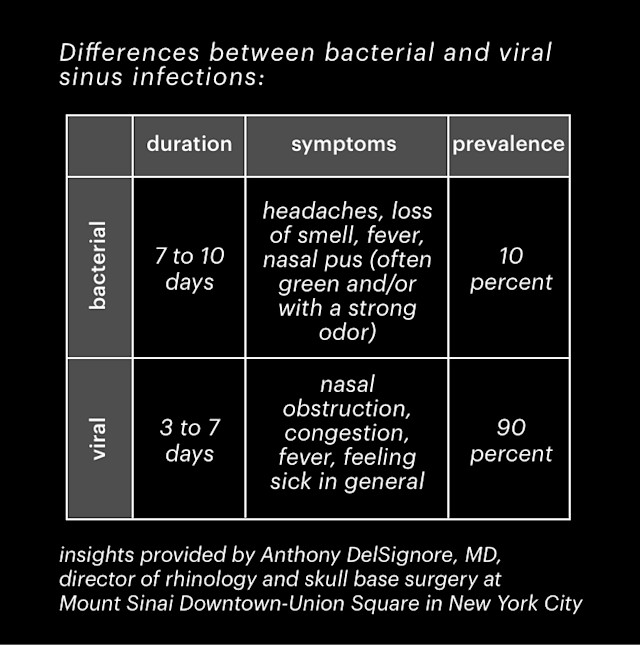Stress, diet, and inflammation could play a role.
You exercise, you eat well, you sleep seven-plus hours per night—but you get sinus infections more often than you consider reasonable. "Even healthy people can be affected if the right circumstances are in play," says Neeta Ogden, MD, allergist and spokesperson for the American College of Allergy, Asthma, and Immunology based in Edison, New Jersey.
You're more likely to come down with them if you have allergies, asthma, a deviated septum, or a weakened immune system.
More people fall into that last category than you might expect; it's not just the elderly and people with autoimmune diseases. Stress reduces immunity, so if you're slammed at work, sleeping too little, training too much, or skimping on nutrition, your defenses take a hit.
A few sinus infections per year is common, but nobody should be getting them as often as four or fives times per year, Ogden says. If you do, there are lifestyle changes you can make to fend them off.

Here, how you can pinpoint the cause and prevent the issue in the future.
How a sinus infection develops:
If yours is bacterial, it can be caused by allergies or a deviated septum. Both issues narrow the passages between the nasal cavity and sinuses (through inflammation and blockages, respectively), explains Ogden.
She likens bacteria-ridden sinuses to clogged pipes: If the natural secretions that flow through those passages can’t clear, the channels get backed up and turn into something of a petri dish where bacteria thrive.
If it's viral, though, you can probably thank a weakened immune system. (More on that below.)
Worse yet, a viral infection can lead to a bacterial infection, even if you don't have a history of allergies or deviated septum. The reason: Viruses cause congestion and inflammation, which bacteria love.
The medicine to take:
For a bacterial infection, your doctor will likely prescribe a simple round of antibiotics. Your symptoms should ease up within three days and you should feel close to 100 percent again within seven to 10.
Viral symptoms, on the other hand, are treated separately. “If you have a fever, take Tylenol; if you’re congested, take Sudafed,” says Anthony DelSignore, MD, director of rhinology and skull base surgery at Mount Sinai Downtown-Union Square in New York city. Nasal sprays can help relieve congestion, too, but you should use them for no more than five days in a row to avoid becoming dependent. Corticosteroid options are much stronger and can further reduce swelling so you can breathe more easily through your nose.
The habits to adopt:
Hydrating keeps the nasal passages moist, allowing mucus to move out freely and helping you feel less congested, DelSignore says. There’s no hard and fast recommendation, but you should aim to drink 48 to 64 ounces (about six to eight glasses) of water a day whether you have an infection or not, he says.
As unappealing as they are, at-home nasal rinses can minimize bacterial buildup. “Microorganisms and allergens enter and settle in the nasal mucosa every day,” Ogden says. Rinses flush them, curing you more quickly and preventing future episodes. (When used as a preventive strategy, rinse once or twice a day, every day.)
Mid-infection, you’ll also need to break from intense workouts; congestion and mucus often lead to mouth breathing, Ogden notes. In turn, you use oxygen less efficiently, which will make everything seem even more challenging.
And remember, exercise is stress. When you’re healthy, that stress actually encourages muscle repair and growth, but when you’re sick, it’ll only make you sicker, longer. If you crave movement, Ogden suggests walking at an easy pace for up to 45 minutes at a time.
Afterward, spend 15 minutes in a steam room or sauna, she adds. The heat can loosen and release some of the mucus that’s clogging your sinuses.
The bottom line:
To speed up your recovery and protect yourself from future infections, eat healthy, whole foods and limit or eliminate those that are known to cause inflammation, such as dairy, red meat, and processed items—during your infection and in general.
Ogden suggests following a Mediterranean diet since it’s rich in antioxidants and therefore, anti-inflammatory properties. You may even consider going plant-based for the same reason, adds DelSignore. If you suspect allergies might be at play, consult an allergist who can get to the root of your congestion. And, importantly, try to relieve stress by meditating and prioritizing sleep and recovery.
Photo: Sune Czajkowski / Blaublut-Edition.com
